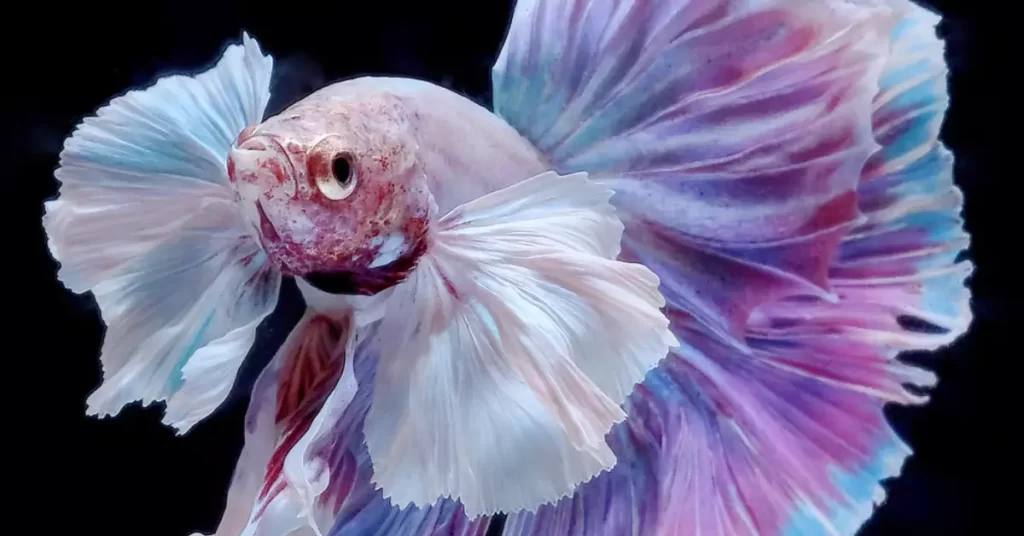Every aquarium owner wants to provide the best care for their fish, and choosing the right food is a crucial part of that.
When it comes to betta fish, people often wonder if tropical fish food is a suitable option.
In this article, we will explore the answer to this question, delve into the dietary needs of bettas, and provide insights into how to ensure optimal health and well-being.
Understanding Betta Fish and Their Diet
Betta Fish Basics
Betta fish, also known as Siamese fighting fish, are small, colorful fish native to Southeast Asia.
They are popular in home aquariums due to their vibrant colors, flowing fins, and unique personalities. Betta fish are carnivorous by nature, requiring a high-protein diet to thrive.
Betta Fish Diet in the Wild
In their natural habitat, bettas primarily feed on insect larvae, small insects, and even tiny crustaceans.
These foods are high in protein and provide the bettas with the essential nutrients they need for healthy growth and development.
Tropical Fish Food vs. Betta Fish Food
Composition of Tropical Fish Food
Tropical fish food is typically designed to cater to a wide variety of fish species with different dietary requirements.
It generally contains a mix of proteins, carbohydrates, and fats, along with essential vitamins and minerals.
However, the protein content in tropical fish food is often lower than what bettas need, and it may have more carbohydrates than it can efficiently process.
Betta Fish Food
Betta-specific fish food is formulated to meet the unique nutritional needs of betta fish. It contains higher levels of protein and fewer carbohydrates, mimicking the betta’s natural diet.
Additionally, betta fish food often includes ingredients like insects and crustaceans, which provide essential nutrients and support healthy growth.
Can Bettas Eat Tropical Fish Food?
While bettas can eat tropical fish food in small quantities, it should not be their primary food source.
The lower protein content and higher carbohydrate levels in tropical fish food may lead to health issues in bettas, such as obesity, lethargy, and a weakened immune system.
Occasional Use of Tropical Fish Food
If you run out of betta-specific food, you can feed your betta tropical fish food for a short period. However, it’s crucial to return to a betta-specific diet as soon as possible to ensure their long-term health.

Tips for Feeding Bettas
Feeding Frequency and Quantity
Bettas should be fed once or twice a day, providing only as much food as they can consume within two to three minutes. Overfeeding can lead to health issues and poor water quality in the aquarium.
Supplementing with Live or Frozen Foods
You can occasionally supplement your betta’s diet with live or frozen foods like brine shrimp, daphnia, or bloodworms. These foods are high in protein and can provide variety and enrichment for your betta.
Monitoring Your Betta’s Health
Regularly observe your betta for any signs of illness or stress, such as loss of appetite, lethargy, or changes in appearance. If you notice any issues, consult an aquatic veterinarian for guidance.
Additional Care Tips for Betta Fish
Optimal Water Parameters
Bettas require a stable environment with a water temperature between 76 and 82 degrees Fahrenheit (24-28 degrees Celsius).
It’s essential to maintain a consistent temperature using a heater and monitor the water parameters, including pH, ammonia, nitrite, and nitrate levels.
Tank Setup and Size
Betta fish need a minimum of 5 gallons (19 liters) of water to thrive. Provide them with adequate hiding spots using decorations, plants, and caves, and ensure proper filtration to maintain water quality.
Social Interaction and Tank Mates
Bettas can be territorial, and housing them with other fish or multiple bettas in the same tank can lead to aggression.
Choose suitable tank mates, such as peaceful community fish, or keep your betta in a single-species tank to avoid conflicts.
Frequently Asked Questions
Can bettas eat goldfish food?
No, goldfish food is not suitable for bettas. Goldfish are primarily herbivores, and their food is formulated with a higher carbohydrate content than bettas require.
Can I feed my betta human food like peas or cooked meat?
Feeding your betta human food is not recommended. Bettas have specific dietary requirements, and human food may not provide the necessary nutrients or may cause digestive issues.
Can I feed my betta live insects?
While bettas do eat insects in the wild, feeding them live insects from your home or garden is not advisable.
These insects may carry pesticides or other harmful substances that can negatively impact your betta’s health.
Conclusion
In summary, while bettas can eat tropical fish food occasionally, it’s best to provide them with a betta-specific diet to ensure they receive the proper nutrients they need to thrive.
By understanding your betta’s dietary needs and providing a well-rounded diet, you can promote their health and well-being, contributing to a happy, vibrant fish in your aquarium.